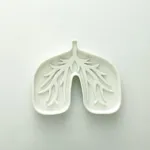Computer model predicts who needs lung cancer screening
Using just people’s age, smoking duration and pack-years of smoking was enough to predict their risk of lung cancer and identify their need for screening
2023-10-03
(Press-News.org) A machine learning model equipped with only data on people’s age, smoking duration and the number of cigarettes smoked per day can predict lung cancer risk and identify who needs lung cancer screening, according to a new study publishing October 3rd in the open access journal PLOS Medicine by Thomas Callender of University College London, UK, and colleagues.
Lung cancer is the most common cause of cancer death worldwide, with poor survival in the absence of early detection. Screening for lung cancer among those at highest risk could reduce lung cancer deaths by nearly a quarter, but the ideal way to determine the high-risk population has been unclear. The current standard-of-care model of lung cancer risk requires 17 variables, few of which are routinely available in electronic health records.
In the new study, researchers used data on 216,714 ever-smokers from the UK Biobank cohort and 26,616 ever-smokers participating in the US National Lung Screening trial to develop new models of lung cancer risk.
A machine learning model used three predictors — age, smoking duration and pack-years — to calculate people’s odds of both developing lung cancer and dying of lung cancer over the next five years. The researchers tested the new model on a third set of data, from the US Prostate, Lung, Colorectal and Ovarian Screening Trial. The model predicted lung cancer incidence with an 83.9% sensitivity and lung cancer deaths with an 85.5% sensitivity. All versions of the model had a higher sensitivity than the currently used risk prediction formulas at an equivalent specificity.
Callender adds, “We know that screening for those who have a high chance of developing lung cancer can save lives. With machine learning, we’ve been able to substantially simplify how we work out who is at high risk, presenting an approach that could be an exciting step in the direction of widespread implementation of personalised screening to detect many diseases early.”
#####
In your coverage, please use this URL to provide access to the freely available paper in PLOS Medicine: http://journals.plos.org/plosmedicine/article?id=10.1371/journal.pmed.1004287
Citation: Callender T, Imrie F, Cebere B, Pashayan N, Navani N, van der Schaar M, et al. (2023) Assessing eligibility for lung cancer screening using parsimonious ensemble machine learning models: A development and validation study. PLoS Med 20(10): e1004287. https://doi.org/10.1371/journal.pmed.1004287
Author Countries: United Kingdom, United States
Funding: This work was supported by the Wellcome Trust (222890/Z/21/Z to TC), the National Science Foundation (1722516 to FI and MvdS), the Medical Research Council (MR/T02481X/1 to NN and MR/W025051/1 to SMJ) and Cancer Research UK (EDDCPGM\100002 to SMJ). The funders had no role in study design, data collection and analysis, decision to publish, or preparation of the manuscript.
END
ELSE PRESS RELEASES FROM THIS DATE:
2023-10-03
Residents of rural counties have overall worse health outcomes than their urban counterparts. A study published in PLOS Global Public Health by William Weeks at Microsoft Corporation, Redmond, Washington, United States and colleagues introduces a Health Equity Dashboard for policy makers to visualize health disparities in specific locations, and to examine the relationship between health-related measures and socio-demographic characteristics.
Despite overall decreasing mortality rates prior to 2020, health disparities between rural and urban areas in the United States have increased. To better understand inequities in health-related measures between rural and non-rural populations, ...
2023-10-03
Food insecurity is four times higher in Brazilian households headed by single women of colour than those headed by married white men, according to research published in the open access journal PLOS Global Public Health. Gender inequities, skin colour and children in the home increase the risk of food insecurity and the authors argue that policy makers need to consider intersectionality in programmes to reduce it.
In 2021 there were 2.37 billion people suffering from food insecurity, with prevalence higher among women than men. The gender gap has increased in recent years, especially in the economic crisis triggered by the COVID-19 pandemic. ...
2023-10-03
ROCHESTER, Minn. — A recent study based on real-world community patient data confirms the effectiveness of the Pooled Cohort Equation (PCE), developed by the American Heart Association and the American College of Cardiology in 2013. The PCE is used to estimate a person's 10-year risk of developing clogged arteries, also known as atherosclerosis, and guide heart attack and stroke prevention efforts. Study findings are published in the Journal of the American College of Cardiology.
The new study highlights to patients and clinicians the continued reliability and effectiveness of the PCE as a tool for assessing cardiovascular risk, regardless of statin use to lower ...
2023-10-03
On 27 September 2023, during a specialised symposium on DNA barcoding at the Bulgarian Academy of Sciences, the Bulgarian Barcode of Life (BgBOL), a Bulgarian DNA barcoding consortium, was founded. By becoming the latest national node to join the International Barcode of Life Consortium (iBOL), the main task before BgBOL will be to coordinate, support, and promote DNA barcoding research in Bulgaria, with a primary focus on the study and preservation of the country's biodiversity.
“The Bulgarian Barcode of Life opens up new horizons and opportunities to study and understand the biodiversity ...
2023-10-03
On-Yee Lo, PhD, Assistant Scientist II at the Hinda and Arthur Marcus Institute for Aging Research at Hebrew SeniorLife and Instructor in Medicine at Harvard Medical School and Beth Israel Deaconess Medical Center, is among the awardees of the 2023 Healthy Longevity Catalyst Awards by the National Academy of Medicine (NAM) together with eight global collaborators representing over 50 countries and territories.
Lo, the principal investigator, and her colleagues were honored for the work with brain stimulation targeting shared networks to improve physical and cognitive ...
2023-10-03
University of Maryland School of Medicine (UMSOM) researchers, as part of the Infectious Diseases Clinical Research Consortium (IDCRC), provided an interim analysis showing that the pentavalent (NmCV-5) meningitis vaccine is safe for use in 9-month-old infants in the meningitis belt of sub-Saharan Africa. They presented their results to the World Health Organization’s (WHO) Strategic Advisory Group of Experts (SAGE) on Immunization on September 26.
SAGE recommended that all countries in the African meningitis belt introduce the novel pentavalent meningococcal ...
2023-10-03
ITHACA, N.Y. – A renter doesn’t generally hold much sway with a landlord or management company, but when tenants organize, their power can be formidable.
Jamila Michener, associate professor of government and public policy, who has spent years researching tenant organizing, asserts that tenants acting collectively can wield power in “Racism, Power, And Health Equity: The Case Of Tenant Organizing,” which published Oct. 2 in Health Affairs.
“It can feel like these families ...
2023-10-03
Targeting Mitochondria 2023
Location: Steigenberger Hotel Am Kanzleramt, Berlin
Date: October 11-13
Network with over 210 participants and stay updated with the latest advancements and research on mitochondria. With more than 83 communications, this year's event promises to expand your understanding of mitochondria and its pivotal role in health and disease.
Mitochondria will pave the way for the next breakthroughs in medicine, stated Prof. Volkmar Weissig, president of the World Mitochondria Society (WMS), and Prof. Marvin Edeas Chairman of the scientific committee. We are impressed with the caliber of speakers and the groundbreaking ...
2023-10-03
A new compound developed at the University of Illinois Chicago potentially could offer an alternative to injections for the millions of people who suffer from an eye condition that causes blindness.
Wet age-related macular degeneration causes vision loss due to the uncontrolled growth and leakage of blood vessels in the back of the eye. A new paper in Cell Reports Medicine led by UIC researcher Yulia Komarova finds that a small-molecule inhibitor can reverse damage from AMD and promote regenerative and healing processes.
The drug can also be delivered via eyedrops — an improvement over current ...
2023-10-03
Graduate Suraj Sudera created an AI powered grill to cook the perfect steak.
His love of engineering led him to create the device called Perfecta™
He founded Birmingham based start-up SEERGRILLS which applies AI and advanced technologies to improve cooking.
An Aston University engineering graduate has created the world’s first AI powered grill.
Suraj Sudera has created a cooking device called Perfecta™ which cooks the perfect steak in 90 seconds.
Suraj graduated from Aston University in 2015 with a BEng in Mechanical Engineering and ...
LAST 30 PRESS RELEASES:
[Press-News.org] Computer model predicts who needs lung cancer screening
Using just people’s age, smoking duration and pack-years of smoking was enough to predict their risk of lung cancer and identify their need for screening







